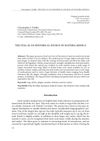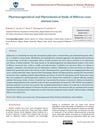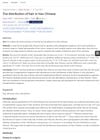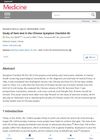 January 2023 in “Acta historiae medicinae stomatologiae pharmaciae medicinae veterinariae”
January 2023 in “Acta historiae medicinae stomatologiae pharmaciae medicinae veterinariae” Stag parts were historically used in medicine for various health issues.
 15 citations,
July 1997 in “Clinics in Dermatology”
15 citations,
July 1997 in “Clinics in Dermatology” Traditional Chinese medications can cause skin reactions, and better testing and reporting are needed to identify allergens.
 3 citations,
July 2020 in “Synthetic and Systems Biotechnology”
3 citations,
July 2020 in “Synthetic and Systems Biotechnology” Scientists improved an enzyme to better produce a hair growth-promoting chemical from an immunosuppressant.
January 2004 in “The Chinese Journal of Dermatovenereology” 1 citations,
April 2016 in “PubMed” Epidermis and dermis cells together can regenerate hair follicles.
 November 2022 in “Gigascience”
November 2022 in “Gigascience” A specific genetic deletion in goats affects cashmere yield and thickness.
Early diagnosis and proper treatment improve outcomes for methylmalonic acidemia.
 1 citations,
February 2024 in “International Journal of Pharmacognosy & Chinese Medicine”
1 citations,
February 2024 in “International Journal of Pharmacognosy & Chinese Medicine” Hibiscus rosa-sinensis Linn. has many medicinal benefits and needs proper identification for effective use.
68 citations,
October 2008 in “Archives of dermatological research” Generalized vitiligo in Chinese patients is linked to other autoimmune diseases, especially in familial cases.
 June 2022 in “Plastic and Reconstructive Surgery – Global Open”
June 2022 in “Plastic and Reconstructive Surgery – Global Open” Stem cell serum effectively treated hair loss caused by COVID-19.
 19 citations,
August 2016 in “Health and Quality of Life Outcomes”
19 citations,
August 2016 in “Health and Quality of Life Outcomes” Metformin helped improve the quality of life for Chinese women with PCOS, especially in physical health and symptoms like infertility, acne, and hair loss.
13 citations,
January 2001 in “Pediatric dermatology” A dark-haired Chinese girl had hair that looked banded under certain light but was normal under a microscope.
5 citations,
February 2022 in “Molecular genetics & genomic medicine” New gene variants linked to a rare inherited hair loss disorder were found in three Chinese families.
 September 2021 in “Hair transplant forum international”
September 2021 in “Hair transplant forum international” Synthetic hair implants can cause infection and scarring, so safer options like follicular unit excision are recommended.
 August 2023 in “Journal of inflammation research”
August 2023 in “Journal of inflammation research” An elderly Chinese man lost all his hair after taking a new heart medication.
3 citations,
November 2019 in “Journal of dermatology” Itraconazole effectively treated a woman's painful skin condition and hair loss.
 271 citations,
June 2013 in “Human Reproduction”
271 citations,
June 2013 in “Human Reproduction” PCOS is common among Chinese women of reproductive age and linked to serious metabolic and reproductive issues, especially in obese women.
 9 citations,
November 2015 in “Gynecological Endocrinology”
9 citations,
November 2015 in “Gynecological Endocrinology” Different types of PCOS in Chinese Han women show varying levels of male hormone and metabolic issues.
 98 citations,
July 2011 in “Fertility and Sterility”
98 citations,
July 2011 in “Fertility and Sterility” An mFG score of 5 or more indicates above-normal hair growth in Southern Chinese women.
 3 citations,
May 2021 in “Evidence-based Complementary and Alternative Medicine”
3 citations,
May 2021 in “Evidence-based Complementary and Alternative Medicine” Some traditional Chinese medicines may have anti-aging benefits and could help with hair growth, but more research is needed.
 52 citations,
November 2009 in “International journal of gynaecology and obstetrics”
52 citations,
November 2009 in “International journal of gynaecology and obstetrics” High androgen levels in Chinese women with PCOS are linked to a higher risk of diabetes and obesity.
13 citations,
November 2015 in “Journal of anesthesia” A woman permanently lost hair on her scalp after a long surgery.
January 2005 in “Pharmaceutical Journal of Chinese People's Liberation Army” Ginseng extract can enhance hair growth at certain concentrations.
43 citations,
January 2016 in “Oxidative medicine and cellular longevity” THSG from a Chinese plant helps with aging and related diseases.
 2 citations,
September 2017 in “Plastic and Aesthetic Research”
2 citations,
September 2017 in “Plastic and Aesthetic Research” Healthy Han Chinese have lower hair density than whites and Africans, and transplanting 300 hair units can nearly restore normal hair density.
 24 citations,
January 2014 in “The American Journal of Chinese Medicine”
24 citations,
January 2014 in “The American Journal of Chinese Medicine” The leaves of Platycladus orientalis have potential health benefits but require more research for safety and understanding how they work.
 8 citations,
March 2021 in “Medicine”
8 citations,
March 2021 in “Medicine” The revised Chinese Symptom Checklist-90 is more reliable and valid for psychological assessments.
November 2022 in “Frontiers in Medicine” Severe hair loss in Chinese men is linked to high blood pressure, while in women, it's linked to larger waist size and cholesterol issues.
January 2008 in “Shanghai Journal of Traditional Chinese Medicine” Androgenic alopecia can be treated by identifying specific syndromes and using combined internal and external treatments.
January 2010 in “Research and Practice on Chinese Medicines” Coffee extract and caffeotannic acid can help treat hair loss.

















